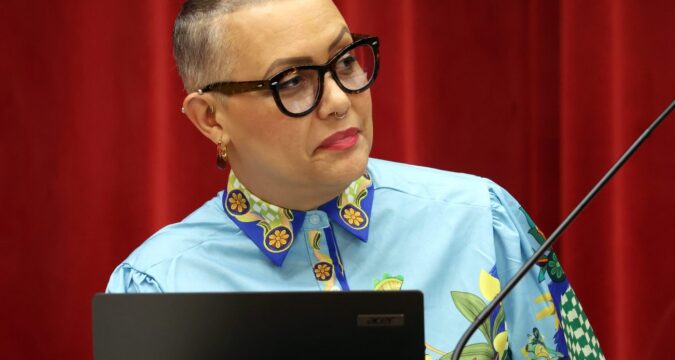
One need not be a cultural anthropologist to appreciate that the most powerful force now driving American life is not hope, or optimism, or confidence.
It is fear.
This fear has been ignited by President Donald Trump and has been fueled by his combative administration and the complicit Republican majority in Congress. It’s been inadvertently fanned by a dispirited, seemingly hapless, Democratic Party and the capitulation of critical institutions such as law firms, corporations and universities that are more focused on self-preservation than honoring their historic missions.
The Merriam-Webster dictionary provides these antonyms for fear: audacity, nerve and guts.
Michelle Morales, president of Woods Fund Chicago, possesses these qualities in abundance. And others as well, such as resolve and determination.
“I have been dismayed at the amount of fear and by the silence of institutions that have bent to the will of this administration,” she told me in a recent interview. “It’s been scary to see how many people have changed, or stayed quiet, or realigned their work. We need to push back, even if there are ramifications for pushing back.”
Morales’ philanthropic statesmanship is based on courage, resilience and her vision of a “reimagined world” rooted in racial and economic justice and basic humanity.
The child of parents from Puerto Rico, Morales was born in Yonkers, New York, and grew up as a self-described “military brat.” She attended DePaul University as an undergraduate, fell in love with Chicago and has lived here since.
She has been a teacher, community organizer and executive director of the Illinois chapter of the Mikva Challenge, which promotes youth civic participation and leadership.
Morales assumed the presidency of Woods Fund Chicago in 2019. It is a private foundation with assets of more than $65 million. Many of its grants support community organizing for racial and economic justice and public policy advocacy.
Morales may run a relatively small foundation, but she has a strong, forceful and authoritative voice. She is an outsized force.
Inside Philanthropy, a respected journal that covers the sector, published a story in June about the quiescence of philanthropy to Trump’s attacks on civil society. “Many funders have opted for silence,” the article says. But it then describes several leaders, including Morales, who have stepped forward, spoken up and refused to be submissive.
“Early on in philanthropy, in the first months of the Trump administration, there was quite a bit of silence,” Morales said. “It’s been heartening to see more and more foundations speak out in the last few months, but the initial silence was scary. It’s important for foundations to take a stand and come out from under the radar.”
She credits the community’s rallying to a Unite in Advance campaign that was launched in April by John Palfrey, president of the MacArthur Foundation; Tonya Allen, president of the McKnight Foundation; and Deepak Bhargava, president of the Freedom Together Foundation. They urged the philanthropic community to aggressively defend cherished values. “We know the risk of standing up to a hostile government. But complacency is complicity. Foundations must lead — not just with grants but with guts,” their organizing essay declared.
Morales argues that this is a deeply consequential moment. She has pushed WFC to go far beyond its traditional annual payout of 5% of assets for current programs. Its expanded financial commitment began in 2020 in response to the pandemic and has accelerated this year, reaching 15%.
“If COVID was the rainy day, this is the monsoon,” Morales said.
She is a passionate advocate for robust diversity, equity and inclusion programs, a commitment WFC has long embraced. Morales was encouraged, but skeptical, when many corporations and universities rushed out statements supportive of diversity, equity and inclusion in the aftermath of George Floyd’s murder by a Minneapolis police officer. She has been disappointed, but not surprised, that many have retreated, given opposition from the Trump administration.
Michelle Morales, president of Woods Fund Chicago, with her son, center, and stepson at a recent Puerto Rican Day Parade in Chicago. (family photo)
“I am concerned about the pulling back. DEI, racial justice work, is not illegal. It’s not unconstitutional. Structural racism is still very real in this country,” she said.
Morales is gearing up for a protracted battle with the administration. But she is also determined to strive for what she calls a reimagined world with strong and effective social programs and commitments to racial and economic justice. And while seeking this better world, she insists that philanthropy must continue to support initiatives that improve the daily lives of those who are struggling.
“As cheesy as it may sound, I have to hold out hope. I believe that the work I’m doing is not only planting seeds but also creating the conditions for the reimagined world I believe in. We may not get there in my lifetime, but I’m going to keep working for it,” she said.
“If I allow cynicism to creep in, I’m done for. I won’t have the energy or the passion or the joy for the work. But I won’t lie. It’s hard to bear witness to the amount of suffering that is occurring.”
John T. Shaw is director of the Paul Simon Public Policy Institute. Shaw’s columns, exclusive to the Tribune, appear the last Monday of each month. His most recent book is “The Education of a Statesman: How Global Leaders Can Repair a Fractured World.”
Submit a letter, of no more than 400 words, to the editor here or email letters@chicagotribune.com.